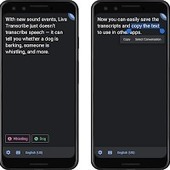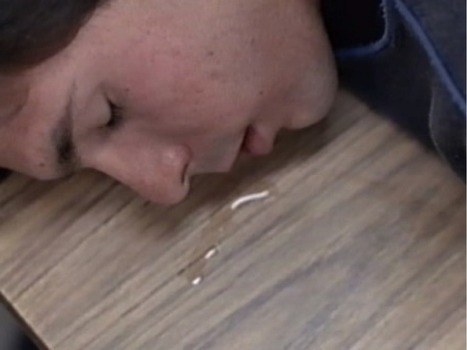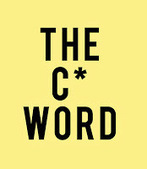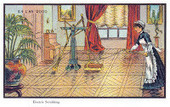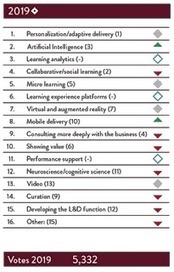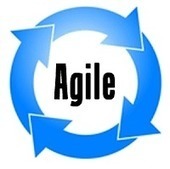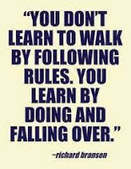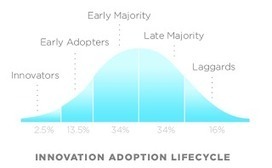 Your new post is loading...
 Your new post is loading...
"Part of the problem with all this talk about 'learning experience' is it's questionable whether learning is actually experienced at all." This brilliant quote, by Leonard Houx, skewers the recent hubris around ‘learning experiences’. Everything is an ‘experience’ and what is needed is some awareness of good and bad learning experiences. Unfortunately, all too often what we see are single event, over-engineered, media heavy, video, animation and single courses that research shows, result, not in significant learning, but… 1) Clickthrough (click on this cartoon head, click on this to see X; click on option on MCQ) that allows the learner to skate across the surface of the content, 2) Cognitive overload (overuse of media) 3) Diversionary activity (infantile gamification).
Video is the medium of the age and AI is the technology of the age. Combine the two and you have a potent mixture. I’ve been involved with both, working in a video production company, using video on all sorts of media, from interactive videotape machines, laserdiscs, compact discs, CDi to streaming, even making a feature film called The Killer Tongue (you really donl;t want to know).
AI is good at narrow, prescribed tasks, it is hopeless at general tasks. This, in my view is why big data and learning analytics projects are less appropriate in learning than more precise, proven uses of AI. There’s a paucity of data in learning and it is often messy, difficult to access and subject to overfitting and other problems when trying to make predictions.
On the other hand, using specific techniques at specific points on the learning journey – engagement, support, delivery and assessment, one can leverage AI to best effect. So here’s five ways this was done in 2018, in real projects, in real organisations, some winning major awards.
Top 20 myths in education and training
Let's keep this simple.... click on each title to get full critique...
Teachers are not ends-in-themselves, they are always a means to an end - improvements in the learner. Given this premise, could it be possible to eventually replace teachers with AI technology? This may not happen soon but let’s, as a thought experiment, ask whether it could. Obvious points are that AI is 24/7, fast, scalable and cheaper. This gives it a head start.
But could it teach? First, we need to break down the functions of teaching and learning. I have used a PGSE schema as my starting point, supplemented by other learning tasks.
Many of the arguments around course completion in MOOCs are, I have argued, category mistakes, based on a false comparison with traditional HE, semester-long courses. We should not, of course, allow these arguments to distract us from making MOOCs better, in the sense of having more sticking power for participants. This is where things get interesting, as there have been some features of recent MOOCs that have caught my eye as providing higher levels of persistence among learners
Time and time again, when dealing with teachers and academics, who have been seriously involved in online learning, I have found that they gained enormously from the experience. They become better teachers.
They do, of course, use a huge range of online resources both after and (interestingly) during lectures. Khan Academy, academic papers, online textbooks, but one tool surprised me. It’s called ‘Anki’, a spaced-practice, flashcard system. What impressed me wasn’t the tool, which I knew of, but the way in which they used the tool.
The massive success of online games led many to suggest that games and gamification, could be used to turbo-charge online learning. Take a little magic dust from gaming, sprinkle generously and we’ll all find it more fun, be more motivated and learn to love learning. But there’s pros and cons here, as it can both help and hinder learning. If gamification is simply scoring, bonuses and badges, the 21st century version of Pavlov's dogs, that would be a disappointment.
The first wave of MOOCs suffer from replicating the standard 6/8/10 week semester college ‘Course’. That’s their problem. They’re too long, sometimes too ‘video’ heavy’ and don’t actually match the needs of the real audience – lifelong learners. The data is clear – MOOCs are for all. This is to be celebrated, not disparaged. Once you flip the benchmark and see MOOCs as evolving towards widespread use by everyone from school students, parents, vocational learners, students, adults, professionals, the retired, then the coin drops. This is all about flipping the model. My talk at Online Educa in Berlin argued that MOOCs are not evolutionary but revolutionary and that now the digital genie is out of the academic bottle, it will spread to other areas, where it will be far more effective and beneficial. MOOCs are NOT about HE, they’re much more important than that.
Educational institutions have choices on MOOCs. What they don’t have a choice on is the use of online learning. To deny students access to online content and learning experiences is to deny reality. At the most basic level this includes the management of learners and learning, even the first step of recording lectures is useful but it also means more sophisticated active learning experiences. To continue with a totally offline strategy is not strategy but stubbornness.
Big Data, at all sorts oflevels in learning, reveals secrets we never imagined we could discover. It reveals things to you the user, searcher, buyer and learner. It also reveals thing about you to the seller, ad vendors, tech giants and educational institutions. Big data is now big business, where megabytes mean megabucks. Given that less 2% of all information is now non-digital, it is clear where the data mining will unearth its treasure- online. As we do more online, searching, buying, selling, communicating, dating, banking, socializing and learning, we create more and more data that provides fuel for algorithms that improve with big numbers. The more you feed these algorithms the more useful they become.
MOOCs are a phenomenon, a wake-up call for Higher Education and wake-up calls, create a sense of urgency, the first step in the process of change. Here are seven MOOC flips that explain why they may be turning traditional Higher Education on its head.
|
We see technology as a noun, not a discipline or subject. There is no -ology for techn-ology, stuck as it is somewhere between science and engineering. Yet this is an area of human endeavour that has shaped history, economics, sociology, psychology and philosophy. The tendency is to see technology in mechanical, material terms, to be stuck in the old paradigm, much as in this vision of robot cleaners in 1899, when the artist tried to imagine the year 2000. What we actually got was an AI driven Roomba. We also see this in the many books about technology, such as Usler's The History of Mechanical Invention and Brian Arthur's The Nature of Technology, although the latter is far more sophisticated in seeing combinations of technology as the deep driver. The word technology comes from the Green Tekhne (art, craft) and logia (writings). We still see technology as ‘tech’ not ‘ology’.
Great survey from my friend and namesake Donald Taylor. We are sometimes confused (in both senses of the word), but when it comes to what’s hot in workplace L&D in 2019, he’s the go to man. This is the 6thyear of his survey, by nearly 2000 professionals making 5332 votes from 92 countries.
Online learning has traditionally been a rather slow in design and production. We can now use AI in WildFire to create content quickly, to produce agile learning and data that allows us to adapt to new circumstances. I may have used the word 'Agile' too often here but it captures, in a word, what is now necessary. The days of seeing online learning production as some sort of feature film project with matching budgets and timescales – months, should be re-examined.
Tim Berners-Lee invented the World Wide Web and published the first web page on this day 25 years ago. Truly remarkable things have happened since then. His gift to the world of learning was a virtual world in which teachers and learners could have unlimited access to knowledge and use the network, that is the internet, to do things that were scarcely thought possible. It is one of the greatest of all inventions and human achievements and of unimaginable importance for the future of education and learning.
I sat through a one hour talk (lecture) on plagiarism this week, where the speaker (University plagiarism bod), showed not a single citation but plenty of anecdotal bullet points. There was even a bit of plagiarism from another plagiarism expert. As the old adage goes, when students copy, it is plagiarism; academics call it research.
What threw me was the complete absence of any critical thought around the nature of the problem. This is a cat and mouse game, where predictable, often identical assignments (largely long-form essays) are set, students procrastinate, share, cut and paste and increasingly purchase essays, only to wait sometimes weeks for often sparse feedback and a solitary grade.
For many things in life we learn by doing, yet this is often missing in online and offline learning. Some even think is it not possible. It is of course possible, in many ways. The entire flight simulation market had been around for decades and clearly delivers high-end performance skills. Soft skills can be taught, and many other domains, even abstract knowledge, benefit from placing the learner in a real context and asking them to DO something, make decisions, choose a tool, ask a question, apply a formula. Learning through scenarios is a well-developed technique.
Text is tricky. Looks easy but on screen it is so easy to make it difficult to read, even unreadable. You have to keep a cool head and resist the temptation to make it glitzy, noisy and ‘cool’ in favour of the clipped, readable and comprehensible. This tension between look and literacy is real, and needs balance, but you can make things look great and readable at the same time. That’s real design.
At Online Educa, I gave a talk called '2500 years of learning - the good, the bad and the ugly'. It went down well but at the end Stephen Downes, who was in the audience, came up to me and made the reasonable claim, that I had mentioned Ng & Koller but not his good self. He was right. I have a lot of time for both of these guys, so I have rectified this by writing this short piece and will be including Downes and Siemens in my future versions of the talk.
Much as Higher Education would like to think it has a monopoly on learning, it is merely one in many, many layers in the learning cake. There is no monolithic MOOC audience. MOOCs are and will become increasingly varied in terms of audience, subjects and pedagogy. This is the big difference between institutional audiences and online audiences. It’s similar to the fractional distillation that has taken place as TV viewers move from scheduled programmes, to catch-up, to on-demand, to boxed sets. MOOCs are not campus courses, they’re online and subject to the behavioural habits of online learners, not the campus. There’s a big difference.
As the MOOCosphere expanded, more and more platforms sprung into action. Some have already delivered large numbers of MOOCs, such as the open source platform EdX and the Coursera. The other big ticket platform is Udacity which has now morphed into a specific market – corporate training. Although the wellspring was in the US, the UK, Europe, India, Russia, Brazil and many others have joined the party. The global LMS/VLE vendors (Blackboard, Desire2learn, SAP) and Moodle have jumped on the bandwagon. Some so-called MOOC platforms aren’t really platforms at all – they’re aggregators. Using the word ‘platform’ to mean ‘place or URL’ on the web. There’s also the ‘let’s call it a MOOC even though it is not’ mob. Apart from this last category, it’s all good.
Now that the digital genie is out of the educational bottle, how will educational institutions react? Things are evolving fast but as Gibson said, the future is already here, it’s just not evenly distributed. However, the future is certainly starting to take shape.
The World Summit on Education in Doha, Qatar brings together educators from around the globe. They literally fly you in, put you up in a fine hotel, feed you and let you rip. Networking here, and that is its strength, is as global as you can get, as you’re guaranteed to speak to people from every continent. It is arguably, as George Siemens says, “world’s most important education conference”.
‘Reinventing education’ was this year’s theme, an admirable goal and badly needed as we know that the Millennium goals will be missed, that the existing model is flawed, costs too high and that demand is exceeds supply. So what happened?
|



 Your new post is loading...
Your new post is loading...



